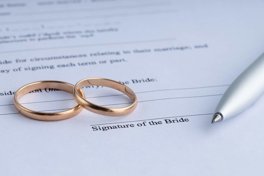How to Protect You and Your Partner
It’s clear that you should consider what steps you can take to protect yourself if you’re living with your partner, but what are the options?
Here are 4 steps you could take:
1. Get Married or Enter a Civil Partnership
Although some people really don’t agree with marriage, it’s one of the simplest ways to make sure you have legal rights in your relationship. If you’re not worried about having all the frills and fuss, it is possible to get married quickly and cheaply. So, if the cost is the only thing holding you back, perhaps you should considerthe legal benefits of being married.
2. Make a Cohabitation Agreement
This is an agreement which deals with your financial arrangements and sets out what will happen to your assets if you separate. It’s similar to a Prenup. It’s a really easy way to protect yourself and can be legally binding too, so when you both agree to making a Cohabitation Agreement, you know you’re both protected. This can be particularly important if you have children together.
3. Make a Declaration of Trust
If you own a property together a Declaration of Trust details the shares each of you have in the property. That means if you do separate, there’s a legal document outlining who will get what share from the property.
4. Make a Will
Unless you make a Will, your partner won’t receive anything from your Estate when you die. That’s because they have no legal rights to your Estate under the Rules of Intestacy (when you die without a Will). The only way you can make sure your partner inherits from you when you’re gone is to make a Will - then your wishes will be legally documented and have to be followed.
If you and your partner are living together and you’re not planning to get married, make sure that you both know where you stand legally and that you take all the right steps to protect yourself, your home and your children.

The Legal Differences Between Marriage and Co-Habitation
Typically, you have much less rights if you are not married. Here we’ll explain the legal differences about being married and co-habiting.
Legal Status
There is no legal status for living together as an unmarried couple. While you may be often asked if you’re married or co-habitating, in legal terms you are considered to be single.
You may be able to formalise some aspects of your relationship without marriage, such as your obligations together as a couple.
If you decide to marry your partner, you will automatically have more rights. For example, if your partner passes away but doesn’t write a Will, you will still inherit their assets and Estate. You will be the preferential person for any inheritance, even before children.
Banking
If you are unmarried and have sole bank accounts, then neither of you is entitled to the other person’s money, even in the event of death. But if you had a joint account, then both of you has access to the account, regardless of whether only one of you contributes to it. If you are certain to remain unmarried, having a joint bank account is one way to protect your finances.
If either of you have a sole bank account but are married, then in the event that one of you passes away, the surviving partner is entitled to receive the full amount automatically. Much like sharing a joint bank account with anyone, regardless of your wedding status, it doesn’t matter who pays into the account, you both will have equal rights over the value.
Children
Whether you are married or not, the parental responsibilities don’t really change. As long as you are both named on the birth certificate, both parents will have parental responsibility over the child. You don’t have to be married to protect your children or to have childcare arrangements in place.
Debts
If you are unmarried, then you are liable for debts that are in your name only. Should you pass away, your debts will not be passed on to your partner, as they are not legally liable.
However, if you are married, then you have some responsibility over your partners debts.hould they pass away, you would then inherit their assets t and would be expected to pay off the debt from your spouses assets. If they have insufficient assets to repay the debt then the balance of the debt dies with them .
Ending a Relationship
If you’re unmarried, ending a relationship is relatively simple. There is no requirement for putting a formal arrangement in place and this should be discussed between you and your partner directly. While the Court will have the power to make decisions over any children that you share, the rest of the arrangements such as financial settlements would be up to you.
If you’re married, this changes things. You will both have to be open and honest about your finances and come to an agreement about a financial settlement. If you can’t agree, then the Court will decide for you how the assets should be divided. It’s always better for you and your partner to agree where possible, as the Court will make a decision based on a range of factors.
Housing
Whether you are married or not, your responsibilities to your housing will remain the same. For example, if you rent a house together, you will likely have a joint tenancy agreement. This means that you are both equally responsible for paying the rent and any bills associated with the house. However, if only one of you is named on the tenancy agreement and you’re unmarried, then only the named person is liable.
If you are married and share a home together, both of you have equal rights to stay in the matrimonial home together. You won’t be able to refuse entry to your partner, unless the Court has stated otherwise.
Next of Kin
When you get married, you will automatically become your partners next of kin. This means that you will be legally allowed to make medical decisions on their behalf, and you will be the first point of contact in the event of any emergency.
If you are unmarried, you would need to appoint your partner as your next of kin. But in law, this is usually your parents, assuming you do not have a child or children who are 18 or older, unless otherwise specified. If an organisation refuses to accept your partner as your next of kin, there is very little that you can do about it.

How We Can Help
If you and your partner aren’t married but you are concerned about how to protect yourself and any children that you may share, we can help.
Get in touch today to arrange a free initial assessment, where we’ll gather all the information, we need about your living situation to see what would be the best route for you and your family.
We’ll give you practical legal advice on how to make sure that you are protected for now and in the future.
Living together but not being married is very common these days, so our expert Family Solicitors are experienced in handling cases similar to yours. You will have the chance to let us know which options you would like to avoid where possible and we will offer alternatives that will give you the most protection.









